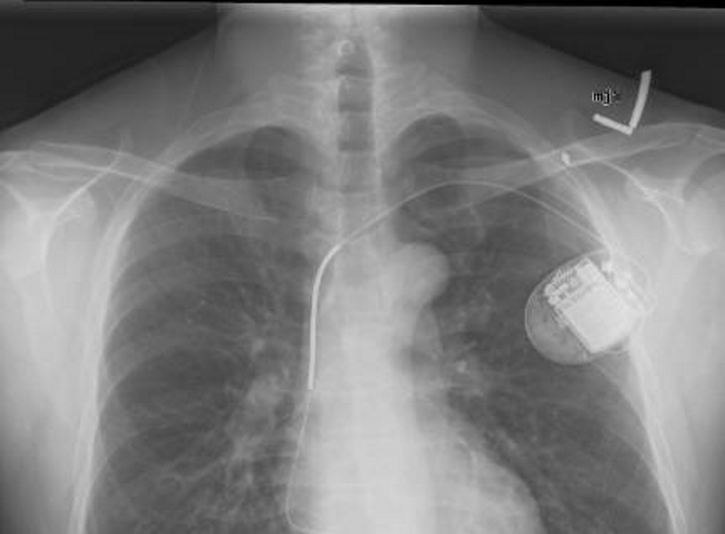
A critical flaw requiring minimal skills to exploit can allow hackers to rewrite defibrillator firmware in implanted Medtronic devices.
— Paul Kedrosky (@pkedrosky) March 21, 2019
Probably safe to assume no-one is going to add activity tracking or a dark mode, so this seems worth worrying about. https://t.co/2rywap3VfZ
The federal government on Thursday warned of a serious flaw in Medtronic cardio defibrillators that allows attackers to use radio communications to surreptitiously take full control of the lifesaving devices after they are implanted in a patient. https://t.co/3TsADc601Z
— Ɠҽҽҟղìҟ (•̪̀●́) Ꝉąҍʂ (@geeknik) March 21, 2019
Hundreds of Thousands of Medtronic Defibrillators Could Be Vulnerable to Hacking Due to Flaw https://t.co/xh5JLJNWce via @gizmodo
— Bob Perciaccante (@orcusomega) March 22, 2019
Hundreds of Thousands of Medtronic Defibrillators Could Be Vulnerable to Hacking Due to Flaw https://t.co/14IFL2H2A8
— Gene Kim (@RealGeneKim) March 22, 2019
It begins, @joshcorman
New: Homeland Security warned of serious vulnerabilities in Medtronic defibrillators — and there's no fix in sight. But patients shouldn't be too worried. https://t.co/kVrDp7Z4wX
— Zack Whittaker (@zackwhittaker) March 22, 2019
RT @rtehrani: 750,000 #Medtronic defibrillators vulnerable to hacking https://t.co/UIChy0kgGF#Cybersecurity #cybercrime #cyberattacks #hacker #hack #breach #phishing #dos #ransomware #malware #virus #apt #pii #nist #fcc #finra #hipaa #pci pic.twitter.com/7WFGb4oiNT
— Debt Erazer (@debterazer_com) March 22, 2019
As many as 750,000 heart devices made by Medtronic PLC contain a serious cybersecurity vulnerability that could let an attacker with sophisticated insider knowledge harm a patient by altering programming on an implanted defibrillator @nathancortez https://t.co/tgmxEbvafe
— Nicolas Terry (@nicolasterry) March 22, 2019
750,000 #Medtronic defibrillators vulnerable to hacking https://t.co/fT2UOPnJES#Cybersecurity #cybercrime #cyberattacks #hacker #hack #breach #phishing #dos #ransomware #malware #virus #apt #pii #nist #fcc #finra #hipaa #pci pic.twitter.com/ZVw86jYUGp
— Rich Tehrani (@rtehrani) March 22, 2019
750,000 Medtronic defibrillators vulnerable to hacking
— Cyberpros (@cyberpros) March 22, 2019
The Homeland Security Department, which oversees security in critical U.S. infrastructure including medical devices, issued an alert. https://t.co/8G3qHSYxPb
750,000 Medtronic defibrillators vulnerable to hacking https://t.co/K5uLqvOyHj
— Adam Levin (@Adam_K_Levin) March 22, 2019
Other sources and storieshttps://t.co/Xs0cm3pNhmhttps://t.co/3xARfC101yhttps://t.co/UQO1sPxic5https://t.co/zi37VKMQmu
— Beau Woods (@beauwoods) March 22, 2019
New: 750,000 Medtronic defibrillators vulnerable to computer hacking https://t.co/G8xBiFr71m
— Joe Carlson (@_JoeCarlson) March 21, 2019
DHS warns of two vulnerabilities affecting about 750,000 Medtronic implantable defibrillators worldwide, which could allow hackers to take control of devices (Joe Carlson/Star Tribune) https://t.co/itMNhx0qOo
— Chris Heilmann (@codepo8) March 22, 2019
NOBODY PANIC! yrs truly quoted in a thoroughly researched @_JoeCarlson news story about a #medtronic implantable cardiac device vulnerability announced today: https://t.co/jZLenJfvlj [1/8] pic.twitter.com/YjwCxsrR18
— Ben Ransford (@br_) March 21, 2019
750,000 Medtronic defibrillators vulnerable to hacking | Star Tribune https://t.co/PYzmkuLHiN
— Winston Smith (@Secbuff) March 22, 2019
750,000 Medtronic defibrillators vulnerable to hacking | Star Tribune @EJSMD @drjohnm @DrKevinCampbell #EPeeps @adribaran do you watchdogs say anything or let them keep denying it is a problem. https://t.co/MTrydXqmPE
— Al Michael's Lisp (@almichaelslisp) March 22, 2019
750,000 Medtronic defibrillators vulnerable to hacking https://t.co/kxRzdDvQNl
— Aryeh Goretsky (@goretsky) March 22, 2019
Don't have a heart attack but your implanted defibrillator can be hacked over the air (by someone who really wants you dead) https://t.co/kUqf1hdF7u #infosec pic.twitter.com/5QN6QgqGxU
— #AI (@AI__TECH) March 22, 2019
Don't have a heart attack but your implanted defibrillator can be hacked over the air (by someone who really wants you dead) https://t.co/a59SHowglv
— Tech L0G ?? ? (@TechL0G) March 22, 2019
Implanted devices from Medtronic can have their firmware rewritten, DHS warns.https://t.co/4vsfttc4hm
— ᴉpᴉǝH (@winter_heidi) March 22, 2019
Critical flaw lets hackers control lifesaving devices implanted inside patients - via @arstechnica https://t.co/Fop954gDVm#HealthIT #CyberSecurity #hackers
— Mike Wilks (@mikewilks) March 22, 2019
The federal government on Thursday warned of a serious flaw in Medtronic cardio defibrillators that allows attackers to use radio communications to surreptitiously take full control of the lifesaving devices after they are implanted in a patient. https://t.co/3TsADc601Z
— Ɠҽҽҟղìҟ (•̪̀●́) Ꝉąҍʂ (@geeknik) March 21, 2019
"Critical flaw lets hackers control lifesaving devices implanted inside patients": https://t.co/65gloWUXTp #ethics #cybersec #tech #health
— Internet Ethics (@IEthics) March 22, 2019
A critical flaw requiring minimal skills to exploit can allow hackers to rewrite defibrillator firmware in implanted Medtronic devices.
— Paul Kedrosky (@pkedrosky) March 21, 2019
Probably safe to assume no-one is going to add activity tracking or a dark mode, so this seems worth worrying about. https://t.co/2rywap3VfZ
Critical flaw lets hackers control lifesaving devices implanted inside patients: Implanted devices from Medtronic can have their firmware rewritten, DHS warns. ? Ars Technica #MedTech #IoT https://t.co/3Xz8bhcGIM
— ReconSecureComputing (@SecRecon) March 22, 2019
Some security flaws can get very personal https://t.co/NzCvkBzJWl
— Alan Woodward (@ProfWoodward) March 22, 2019
Seriously guys, where is the adult supervision?
— Matthew Loxton (@mloxton) March 22, 2019
Critical flaw lets hackers control lifesaving devices implanted inside patients https://t.co/AXLhRwJKhj
Critical flaw lets hackers control lifesaving devices implanted inside patients https://t.co/IOZWacV9Y9
— Aryeh Goretsky (@goretsky) March 22, 2019
750,000 Medtronic Defibrillators Vulnerable To Hacking.. other of god.. don’t have a heart attack this week!! https://t.co/DsLOhk2gvD
— Dez Blanchfield (@dez_blanchfield) March 22, 2019
No authentication. No encryption. Network connected. Medical device. https://t.co/bin2NivArd
— Alex “Jay” Balan (@Jaymzu) March 22, 2019
750,000 Medtronic Defibrillators Vulnerable To Hacking https://t.co/4S2K7N9b9F
— Slashdot (@slashdot) March 22, 2019
After seeing the excellent (yet frightening) keynote from @MarieGMoe at @boosterconf last week this news highlights the severity of the situation. https://t.co/ah8DjQaBl1
— Tom Glover (@thomasglover) March 22, 2019
[아스테크니카] 생명유지장치를 해커가 조작할 치명적 결함https://t.co/KqvxEfdEB7
— 라루얀 / 말썽쟁이 구운 경단 ? (@LaruYan) March 23, 2019
케어링크 제세동기가 통신 암호화도 인증도 없으는 결함들 때문에 해커가 환자 가까이서 저장된 환자/담당의 정보를 보거나 펌웨어를 덮어쓸 수 있는 문제가 발견. 루트 접근은 MD5 해싱된 8자 비밀번호를 뚫으면됨
”The U.S. government has issued a warning of a serious flaw in Medtronic cardio defibrillators that allows attackers to take full control of the lifesaving devices after they are implanted in a patient.” https://t.co/B24KXHhoFb https://t.co/lDTB7ED1BK
— @mikko (@mikko) March 23, 2019
Critical Flaw Lets Hackers Control Lifesaving Devices Implanted Inside Patients https://t.co/hSJmkEQWbn #news
— packet storm (@packet_storm) March 22, 2019
more awesome news https://t.co/NjZ8mYkDbX
— threat level: beige (@TimCushing) March 22, 2019
.png)